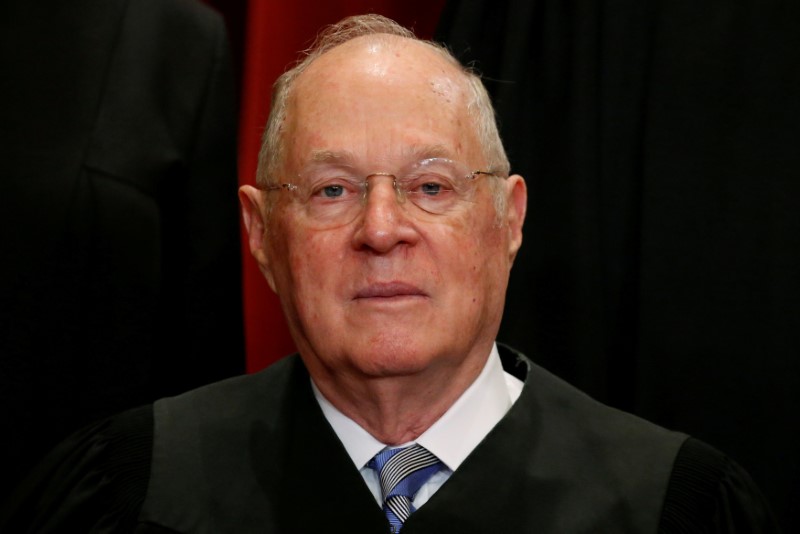By Andrew Chung
WASHINGTON (Reuters) - Supreme Court justices clashed on Tuesday over whether courts should curb the long-standing U.S. political practice of drawing electoral maps to entrench one party in power, with conservative Anthony Kennedy likely to cast the deciding vote.
The nine justices heard an hour of arguments in the major voting rights case out of Wisconsin involving the practice known as partisan gerrymandering. Their ruling, due by June, could have an impact on U.S. elections for decades by setting standards for when electoral districts are laid out with such extreme partisan aims that they deprive voters of their constitutional rights.
Kennedy, who sometimes sides with the court's liberal justices in big rulings, did not definitively tip his hand on how he would rule but posed tough questions to Wisconsin's lawyers that signaled his aversion to electoral districts drawn to give one party a lopsided advantage in elections.
Liberal justices voiced sympathy for the Democratic voters who challenged the Republican-drawn legislative map in Wisconsin as a violation of their constitutional rights. Conservative justices expressed doubt about whether courts should intervene in such highly political disputes, and questioned the challengers' legal standing to bring the case. The court has a 5-4 conservative majority.
Gerrymandering, a practice that began two centuries ago, involves manipulating boundaries of legislative districts to benefit one party and diminish another.
Democratic and Republican critics argue that gerrymandering is becoming more extreme because it now can be guided by precise voter data and mapmaking technology, distorting the democratic process by letting politicians choose their voters rather than the other way around.
Legislative districts in the 50 U.S. states, redrawn every decade after the national census to reflect population changes, represent the individual components of representative democracy.
Kennedy pressed Erin Murphy, a lawyer for Wisconsin's state Senate, on whether it would be unconstitutional for a state law to contain explicit provisions favoring one party over another. Murphy conceded it would be.
A federal three-judge panel ruled 2-1 last November that Wisconsin's redistricting plan violated the Constitution's First Amendment right to freedom of expression and association and 14th Amendment guarantee of equal protection under the law because of the extent to which it marginalized Democratic voters. Wisconsin appealed that ruling to the high court.
In a 2004 ruling in another case, Kennedy parted with his conservative colleagues to suggest that if partisan gerrymandering went too far, violating the Constitution, courts may have to step in if a "workable standard" for deciding when to do that could be found.
"Gerrymandering is distasteful," conservative Justice Samuel Alito said.
But Alito voiced doubt over whether the metrics used to measure gerrymandering, drawn from social science and endorsed by the lower court, were manageable. Conservative Chief Justice John Roberts called those metrics "sociological gobbledygook."
Conservative Justice Neil Gorsuch said a court-approved formula for identifying unconstitutional gerrymandering would be hard to achieve, comparing various standards proposed to spices on a steak dinner. "What's this court supposed to do? A pinch of this, a pinch of that?" he asked.
He voiced doubt that the Constitution authorizes courts to step in at all.
'TIME TO TERMINATE'
The challengers received some muscular support. "It is time to terminate gerrymandering," Republican former California governor Arnold Schwarzenegger, the star of the "Terminator" movies, told a rally outside the courthouse.
Redistricting typically is done by the party controlling a state's legislature. Gerrymandering is usually accomplished by concentrating voters who tend to favor a particular party in a small number of districts to reduce their statewide voting power - called packing - while scattering others in districts in numbers too small to be a majority - called cracking.
The Supreme Court for decades has been willing to invalidate state electoral maps on the grounds of racial discrimination but never those drawn simply for partisan advantage.
Roberts raised concerns about the high court approving or rejecting future state electoral maps, suggesting the public could start viewing the court as a political body.
"That is going to cause very serious harm to the status and integrity of the decisions of this court in the eyes of the country," Roberts added.
Some liberal justices wondered what would happen to voters if partisan gerrymandering made election results preordained.
"What incentive is there for a voter to exercise his vote?" Justice Ruth Bader Ginsburg asked. "What becomes of the precious right to vote?"
Wisconsin's electoral map, drawn after the 2010 U.S. census, enabled Republicans to win a sizable majority of Wisconsin legislative seats despite losing the popular vote statewide to the Democrats. The party's majority has since expanded.
The plaintiffs' attorney, Paul Smith, urged the justices to act. "If you let this go," he said, "in 2020 you're going to have a festival of copycat gerrymandering, the likes of which this country has never seen."

"You are the only institution in the United States ... that can solve this problem," Smith added.